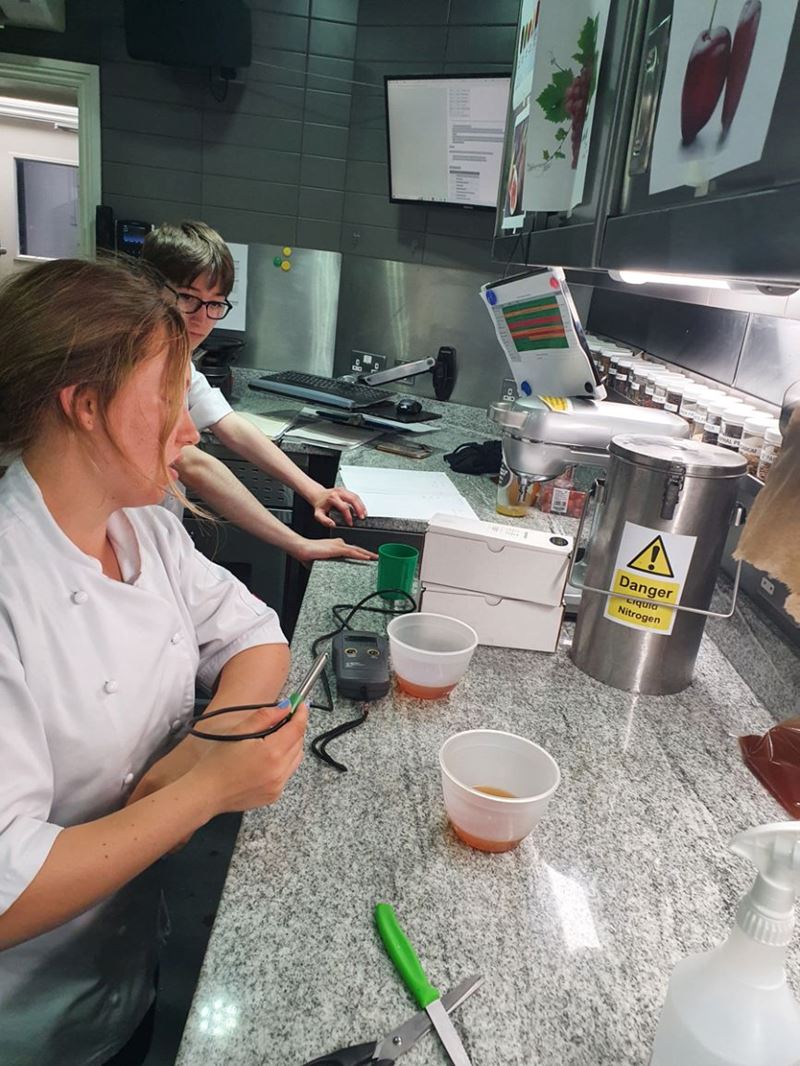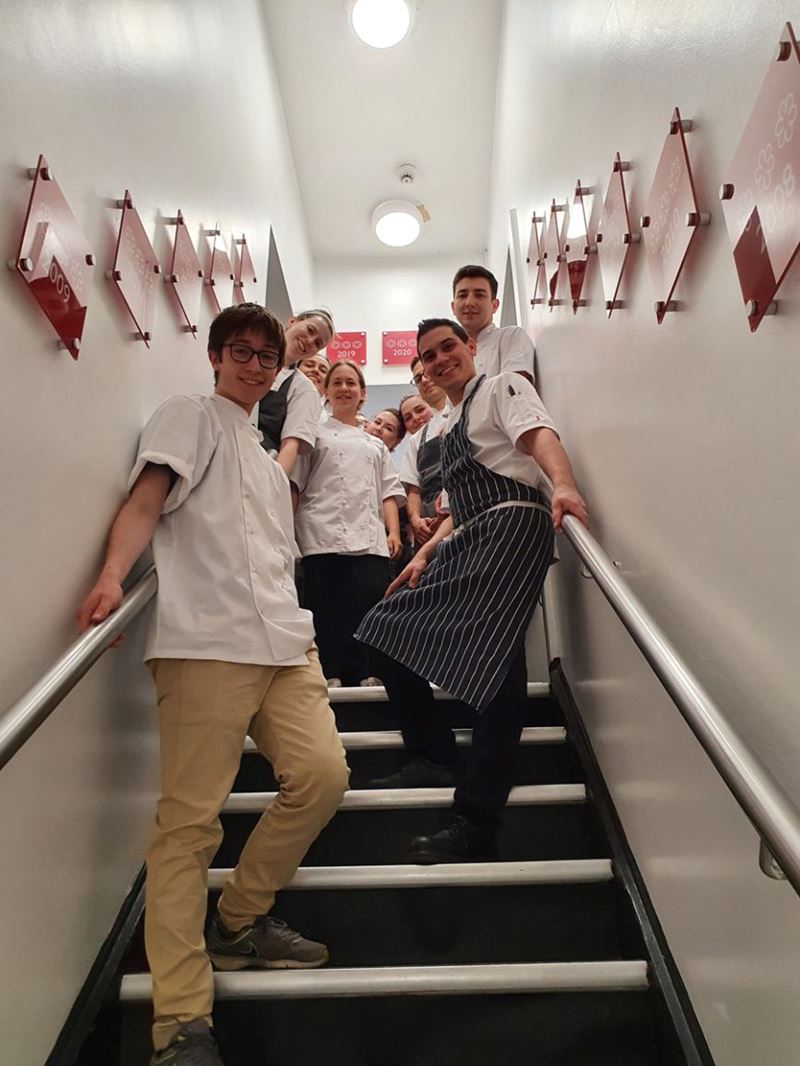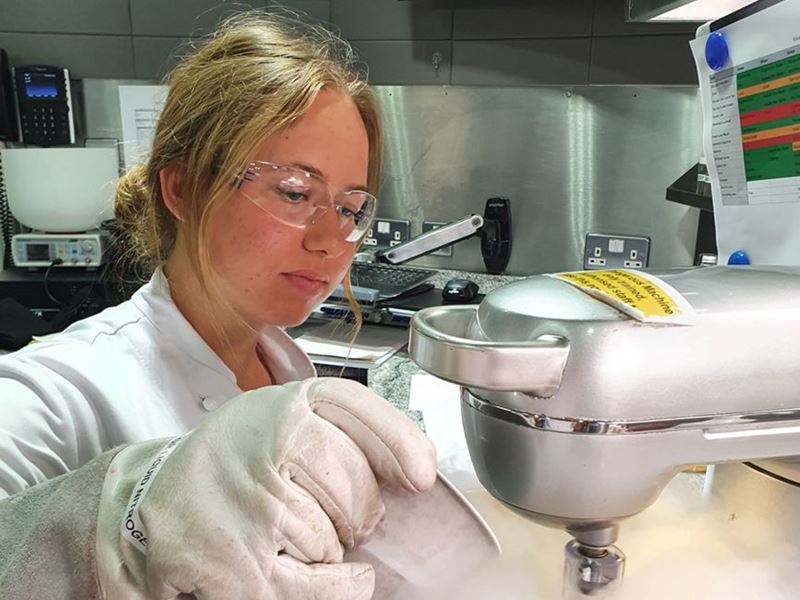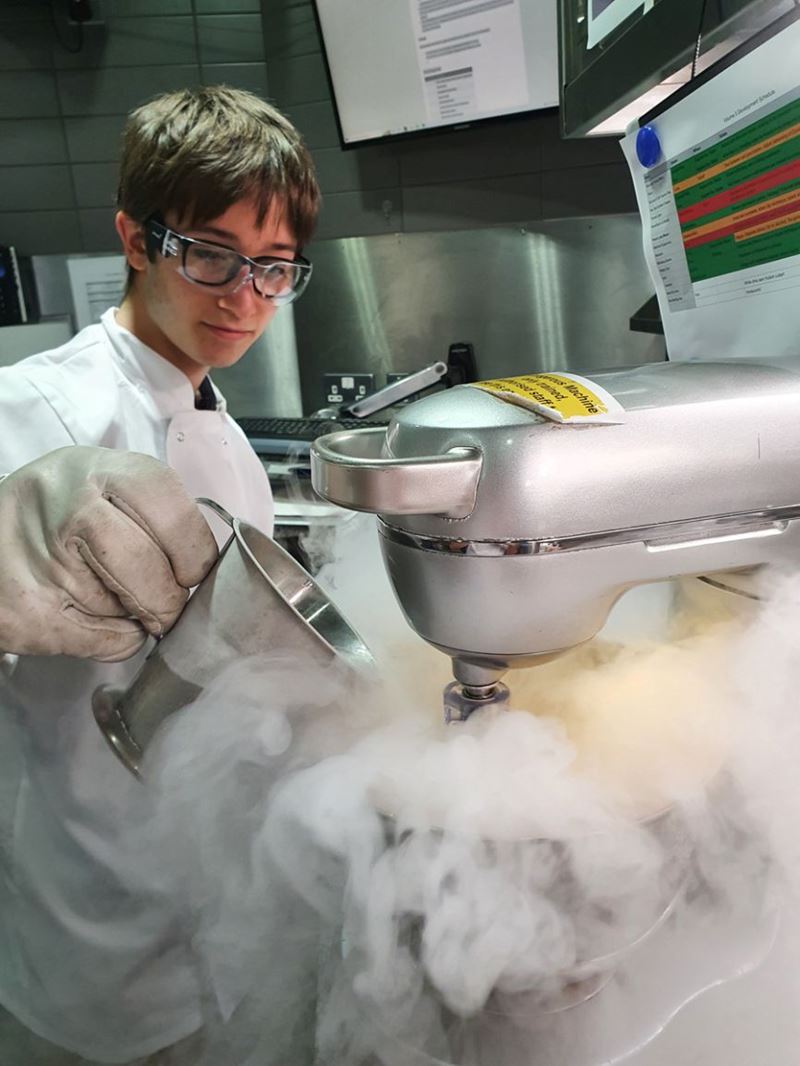Heston Blumenthal restaurant hosts food video competition winners
Two winners of a food-based video competition were rewarded with a visit to star chef Heston Blumenthal's Fat Duck restaurant.
Alexandre Peuch and Daisy Jackson enjoyed a culinary masterclass and sampled a taste of life in a top kitchen, as the RSC Thames Valley Local Section honoured their fine work in the 2020 video contest.
Secondary school students were asked to find or create a simple experiment that could be carried out in their kitchen using food ingredients to explain an idea they had learned over the course of their chemistry education. They also had to film their efforts and produce an activity sheet so that a new student in year 7 could understand it.
Alexandre prepared an experiment on oxidation using an apple slice, while Daisy’s experiment focused on a red cabbage indicator. As a prize for their winning entries, the pair were invited to the Fat Duck restaurant and also got to spend time at Reading Scientific Services Ltd (RSSL) at the University of Reading.
Below, they recap their incredible experiences in their own words, picking out highlights and giving us a flavour of what it is like inside a cutting-edge kitchen.


Daisy Jackson
On our first morning, we started with a tour of the many kitchens, met lots of the chefs, and helped with some small tasks in the pastry kitchen. The afternoon was spent in the service kitchen, where the head chef coordinated the creation of a variety of dishes on the lunch menu. We even had the chance to plate up some of these, which required a steady hand and lots of attention to detail.
We also tried some of the signature dishes, such as the Sound of the Sea (a dish of sashimi, tapioca ‘sand’ and sea foam served with a conch shell that has an audio device inside it playing the sound of waves and seagulls), and a fantastic grape dessert.

During the second day we had the opportunity to spent time in the development kitchen, where new dishes are created and perfected in a process often lasting several years. We spent the day alongside one of the development chefs, testing a few different brands of an ingredient for one of Heston Blumenthal’s new dishes, and deciding on which to use in the final version.
Using liquid nitrogen to make ice cream within seconds, plating up dishes in the buzz of the service kitchen, and trying some very innovative culinary creations - such as mustard ice cream - were all stand-out moments of my time at the Fat Duck.
Alexandre Peuch
On the first day, after quick introductions, we had a tour of The Fat Duck’s kitchen and the other rooms where some components of the dishes are prepared. From then on until lunchtime, we had the opportunity to see how the team worked in preparation for service and we even had a chance to help with some of the easier tasks.
Before service, we had lunch together with all the staff and it was a great experience seeing how everyone came together and the sense of community was great. Following this, service started, and we spent the rest of the day in the service kitchen. The atmosphere was focused and the hard work going on behind the scenes in the kitchen was amazing.
Seeing how everyone worked as a team and observing the communication between everyone in the kitchen was really interesting; being there to witness it all was a particular highlight. Everybody knew what they were supposed to do, and the head chef acted as if he were the conductor of an orchestra.
We even got the chance to try out two dishes – it was the best food I had ever eaten in my life.

We spent the second day in the development kitchen. I was surprised by how much effort is put into designing the dishes, selecting the best possible ingredients and identifying the best way to prepare them. There, the parallels with chemistry were most obvious.
We were given a project to make tomato water using three different types of tomatoes to find out which was better for a particular dish given the resulting sweetness, acidity, and other factors. Doing this required using a few processes like centrifugation, which was super interesting.
With the extremely high temperatures outside, a break to make ice creams using liquid nitrogen was most welcome! It was amazing to see how liquid nitrogen can be used for this purpose, which I wouldn’t have imagined.
These two days were a great experience, with the opportunity to see how a world-leading kitchen works from the inside, and how each and every dish is carefully crafted - nothing is left to chance! All the staff we interacted with were very friendly and this also contributed to making this visit so enjoyable.
More amazing lab experiences
The second part of the prize for the competition winners was a day at Reading Scientific Services Limited, which Alexandre recapped.
To start the day off, we had a quick chat and round of introductions. We were then given goggles and a lab coat, ready to explore the microscopy department on the University of Reading campus. There, we prepared various samples on microscope slides and, using various pieces of equipment, we were able to analyse them.
One of the coolest high-tech instruments that we were shown was an infrared spectrometer, which we used to produce a spectrum for a piece of plastic that each of us had brought to determine the exact molecule it was made of. It turned out that my sample, from a little owl onto which I put my glasses at night, was made of acrylonitrile butadiene styrene (ABS).
Following this, we had lunch with some free ice cream! In the afternoon, we had a quick tour of the lipids department in which we saw a titration. This was particularly interesting, as we had done several titration experiments at school and to see how this was set up and used in industry was fascinating.
Finally, we had a general tour of the RSSL facilities and it was exciting to see the wide range of activities going on supporting many real-life projects of direct interest to industry.
I really enjoyed this day at RSSL, which made me appreciate that chemistry is far more than just a subject at school and university or even a research domain. It consists of a range of operational methods and equipment and these underpin many critical aspects, especially in the food industry. Without chemistry, the chocolate bars we have or the drinks we enjoy would maybe not exist.
Press office
- Tel:
- +44 (0) 20 7440 3351
- Email:
- Send us an email
